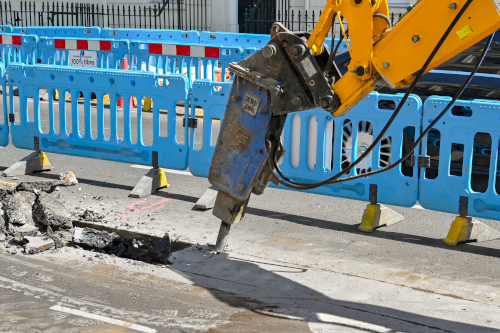Local authorities should be given new powers, overseen by a national 'street works commissioner', to limit the disruption and congestion caused by street works, influential MPs have said.
The cross-party Transport Select Committee said it had heard 'overwhelming evidence from local authorities that the current regulatory regime leaves them ill-equipped to monitor and coordinate utility companies' street works, or to penalise companies that behave badly'.
In response, its latest report calls for a range of measures that could reshape the often contentious relationship between councils and utility companies.
The key recommendations were:
- Extend the reinstatement guarantee period from two years, or three for deeper excavations, to five years
- Tighten the use of 'immediate' permits to prevent misuse
- Greater devolution of lane rental schemes without secretary of state approval
- Require utilities to share more information to support longer-term planning
- Create a new street works commissioner, similar to the devolved role of the Scottish Road Works Commissioner.
Transport Committee chair Ruth Cadbury said: 'Our report sets out a shopping list of small changes that could make a huge difference, sharpening the teeth of the regulations that already exist while also providing incentives for utility companies to work efficiently and coordinate their work with councils.
'Upping the quality of reinstatement works will help stem the never-ending plague of potholes on local roads. Lane rental schemes should provide a financial incentive to complete works on time. And longer-term planning and earlier notification should help councils prevent the infuriating occurrence of multiple roads being closed in one locality, or the same road being dug up multiple times in one year.'
Around 2.2 million street and road works were carried out in England between April 2023 and March 2024.
Over 200 organisations have the right to dig up roads - known as statutory undertakers.
Extending the reinstatement period guarantee
One major issue is the quality of reinstatements when utility companies dig up roads to install or repair pipes and cables for gas, water, electricity and broadband. Poor reinstatement repairs can have a major impact on the lifespan of the highway.
The committee MPs recommended that the guarantee period for reinstatements should be extended from two years - three for deeper excavations - to five years.
'At present, if cracks begin to appear after just two years the local council will be forced to spend taxpayers' money on patching the road up again. This change will incentivise companies to do a better job in the first place,' the MPs said.
Utility companies should also face fines for any secondary remedial work that is required to the road or pavement within five years, as a penalty for the unnecessary disruption caused, MPs recommended.
Tightening the use of immediate permits
The use of ‘immediate' or ‘urgent' permits allows utility companies to begin works without needing to notify the local authority until up to two hours after the work has started. They are designed for use in extreme circumstances, like a burst water main.
The use of these permits is becoming 'more common', the committee found, and councils have 'raised concerns that they were being 'misused' to cover works which 'had been known about for weeks'.
The Committee called on the Department for Transport (DfT) to consider a new definition for these permits to prevent their misuse. This could include reforms to ensure the level of advance warning required is linked to the severity of disruption. The DfT should also consider whether fines could be used against companies found misusing the system, MPs said.
Greater devolution of lane rental schemes
Under lane rental schemes, utility companies pay a basic daily charge of up to £2,500 for each day that works are carried out on a road, incentivising efficiency.
There are currently only five lane rental schemes in operation. The DfT is currently assessing eight new applications for schemes and said it knew of 'at least twelve more applications being prepared'.
The Government has set out proposals to let mayoral strategic authorities approve their own lane rental schemes, while other areas will still need approval from the transport secretary.
MPs said the department should go further and let more local authorities set up schemes without the need for approval from central government.
Require utilities to share more information to support longer-term planning.
The DfT has guidance in place that encourages, but does not require, utility companies to share ‘forward planning information' on the national Street Manager digital platform.
The committee said: 'Utility companies should be required to share information on their upcoming work with local authorities—as should housing developers, who ought to be able to plan works to connect new houses to utilities well in advance.'
The creation of a Street Works Commissioner
The Committee said: 'Where disputes arise between utility companies and local authorities, sometimes as a result of differing interpretations of legislation and guidance, an independent function for resolving these disputes short of legal action could save money and time.'
The new position of a Street Works Commissioner, similar to the road works commissioner role in Scotland where powers are devolved, would help ensure 'the consistent application and interpretation of legislation, provide an option for independent dispute resolution between councils and companies, and monitor performance across the sector'.
































